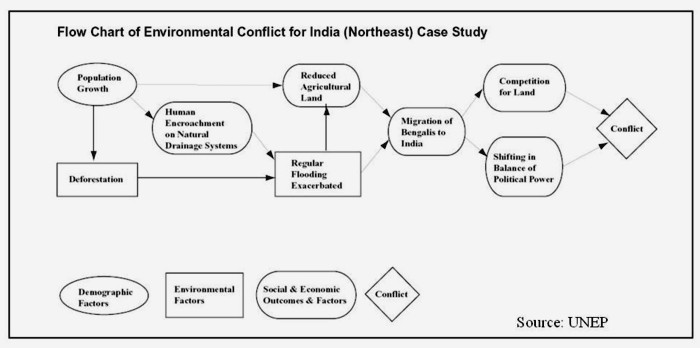/topics/conservation-reducing-water-usage
Conservation - Reducing Water Usage
Multi-stakeholder dialogue is messy, but necessary
Posted on 16 Feb, 2012 01:32 PMA workshop on ‘Understanding and resolving water conflicts in the North East India', was organized by Forum for Policy Dialogue on Water Conflicts in India (Forum), in collaboration with Aaranyak (Guwahati), Centre for the Environment, IIT (Guwahati), Arghyam (Bangalore), SaciWATERs-CapNet Network (SCaN) and Cap-Net to discuss emerging issues related to water conflicts and their resolution in the region. This workshop was held in Guwahati on January 23-26, 2012. It aimed at presenting concepts and theory related water conflicts as well as issues especially relevant to the North East Region.

Adapting to climate change - Conserving rice biodiversity of the Apatani tribe in North East India - An IGREC working paper
Posted on 15 Feb, 2012 11:47 PMIt also deals with the threat to the biodiversity in the area due to climate changes and argues for the need to devise adaptation strategies at an urgent level to preserve the unique genetic variability of the region and the indigenous knowledge of farming practices in the area.
Climate: Observations, projections and impacts - India - A report by the Met Office (UK)
Posted on 15 Feb, 2012 03:25 PMThis was done as a part of a project that aimed at compiling scientifically robust and impartial information on the physical impacts of climate change for more than 20 countries.
Adaptation to climate change with a focus on rural areas and India - A document by GTZ (India)
Posted on 15 Feb, 2012 01:59 PMIt aims to strengthen the capacities of rural communities in India to live with climate variability and change. The work includes supporting governments of four partner states of Rajasthan, Tamil Nadu, Madhya Pradesh and West Bengal, local communities and other relevant stakeholders in identifying, developing and carrying out adaptation measures in pilot regions.
RCDC invites applications for Expert, Land & Water Conservation, Orissa - Apply by February 15, 2012
Posted on 15 Feb, 2012 09:50 AMContent courtesy: DevNetJobsIndia

Regional Centre for Development Cooperation (RCDC) is a not for profit making organisation having its head office in Bhubaneswar promotes community based natural resources management for poverty reduction and has been primarily operating in Odisha since 1993. The activities of RCDC include; research and documentation, publications, advocacy and networking and direct filed intervention in 14 districts.
Living rivers, dying rivers: Rivers in the Western Ghats
Posted on 10 Feb, 2012 04:12 PMRiver stories from Maharashtra: Many morals to learn
Parineeta Dandekar’s presentation began with an account of some statistics related to Maharashtra, the third largest state in India. Regarding the state of water resources in Maharashtra, she noted that of the five river basin systems, 55 percent of the dependable yield is available in the four river basins (Krishna, Godavari, Tapi and Narmada) east of the Western Ghats. These four river basins comprise 92 percent of the cultivable land and more than 60 percent of the population in rural areas. 45 percent of the state's water resources are from west flowing rivers which are mainly monsoon specific rivers emanating from the Western Ghats and draining into the Arabian Sea.
With 1821 large dams and more in the offing, Maharashtra has the maximum dams in the country (35.7%). However, the proportion of gross irrigated area vis a vis the gross cropped area at 17.8 percent is much lower than the national average of 44.6 percent. The contradictions from the state, which is home to the highest number of dams, were discussed. In nearly 70 percent of the state’s villages (around 27,600 villages), water is either not available within 500 metres distance, or within 15 metres below ground level or when available is not potable (World Bank, Promoting Agricultural Growth in Maharashtra, Volume 1, 2003).
Dandekar discussed the World Bank funded Maharashtra Water Sector Improvement Project (MWSIP) initiated in 2005 whose main components were establishment, operationalisation and capacity building of Maharashtra Water Resources Regulatory Authority (MWRRA); establishment of river basin agencies in Maharashtra; and restructuring and capacity building of the Water Resources Department. The MWRRA Act (2005) has been amended, taking out the clause for equitable water distribution, and granting the Cabinet the rights to have the last say about water entitlements. This has led to a diversion of water for irrigation from the vulnerable, suicide-prone Vidarbha region to thermal power plants. According to Prayas, “entitlements of more than 1500 MCM have been changed from agriculture to industries and cities”.

"Bottle it up: We can use it" - Scientific studies on human urine - A presentation by Arghyam
Posted on 10 Feb, 2012 11:13 AMThis presentation by Arghyam includes the results of doctoral study done by G Sridevi under the guidance of Prof.
Water conservation, sustainable agriculture, challenges for rural development in Maharashtra and possible solutions - Talk by Popatrao Pawar, Sarpanch, Hivre-Bazar
Posted on 09 Feb, 2012 04:49 PMShri Popatrao Pawar is an inspiring promoter of the 'Ideal Villages Movement' on "Integrated Agriculture and Rural Development for Tomorrow's Maharashtra" on the occasion of the inauguration of Observer Research Foundation's Maharashtra@50 Study Centre on 24th June 2010.
Lift irrigation - Methods and practices: A manual by Mihir Maitra (AFPRO)
Posted on 09 Feb, 2012 12:07 PMAccordingly, the book is written as a technical manual that remains accessible to people seeking to gain necessary expertise in the planning, design, installation and maintenance of lift irrigation systems (LIS).
Governing the urban poor - Riverfront development, slum resettlement and the politics of inclusion in Ahmedabad - A paper published in EPW
Posted on 08 Feb, 2012 11:58 AMSabarmati Riverfront Development (SRD) project, an urban mega-project in Ahmedabad has been proclaimed as a case based on “flexible governing” of the residents of the riverfront informal settlements.





